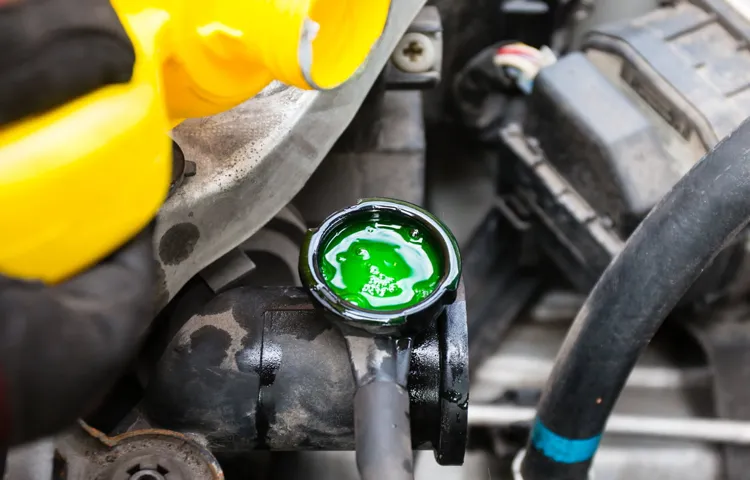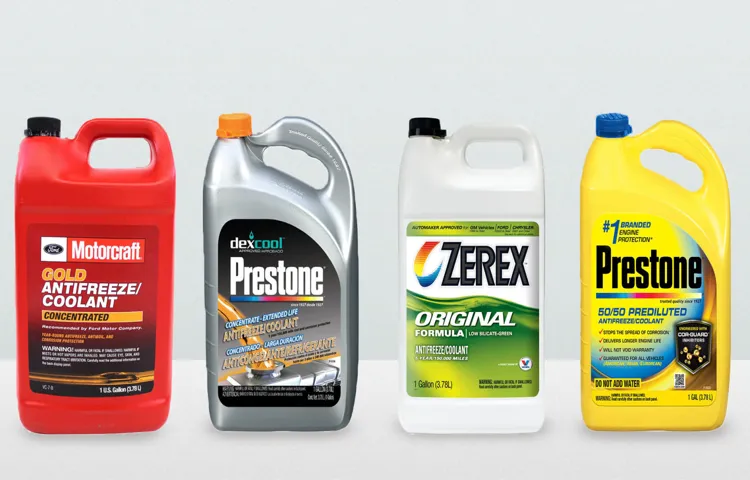If you’ve spent any time around vehicles, you have probably heard of coolant. It’s something that is necessary to keep a car running properly, especially during hot summer months. If you’re not sure what coolant is or how it works, don’t fret! We’re here to help you understand this essential car fluid.
Coolant is a liquid that’s added to engines to regulate temperature. It circulates through the system to absorb the heat generated by the engine and prevent it from overheating. Coolant is typically a mix of water, anti-freeze, and other additives that protect against corrosion and buildup.
But how does coolant achieve this miraculous feat? Think of coolant like sweat. When you work out, your body sweats to cool down and regulate your temperature. In much the same way, the hot engine generates heat that needs to be dissipated, so coolant absorbs that heat and carries it away.
Just like how sweating is vital for human performance, coolant is vital for the performance of your car. There you have it – the basics of what coolant is and why it’s so important. Stay tuned for more in-depth information on the types of coolant, how to check and refill your car’s coolant levels, and other helpful tips for keeping your car in tip-top shape!
Introduction
“What is the coolant?” Coolant, also known as antifreeze, is a liquid that helps regulate the temperature of an engine by absorbing and dissipating heat. It circulates through the engine and prevents it from overheating by transferring heat away from the combustion chamber and into the radiator. The coolant is usually a mixture of ethylene glycol or propylene glycol along with water and other additives that help prevent rust, corrosion, and foaming.
It also contains a dye that distinguishes it from other liquids and helps with leak detection. Coolant is critical for the engine’s optimal performance and should be replaced according to the manufacturer’s recommendation. Over time, coolant can break down, lose its efficiency, and become contaminated, which can cause costly damage to the engine.
Therefore, it is crucial to maintain the coolant level and quality to ensure a smooth and long-lasting engine life.
Defining Coolant
Coolant When it comes to engines, coolant is a vital component that plays a critical role in maintaining optimal performance and ensuring longevity. Essentially, coolant is a fluid that circulates through an engine’s cooling system to absorb heat generated by the engine and transfer it to the atmosphere. It’s typically a mixture of water and antifreeze, which contains additives that help prevent corrosion, lubricate moving parts, and raise the boiling point to prevent overheating.
Coolant is essential for regulating an engine’s temperature and preventing it from overheating, which can cause severe damage to the engine’s components. Without coolant, an engine could quickly overheat, leading to significant downtime, costly repairs, and even total engine failure. Therefore, it’s crucial to use the right coolant mixture and ensure it’s properly maintained to avoid potential engine problems and protect the engine’s lifespan.

Importance of Coolant in Vehicles
Coolant Introduction: When it comes to vehicle maintenance, there are several things that need to be properly taken care of to ensure its longevity and optimal performance. One of the essential components that often get overlooked is the coolant system. In simple terms, the coolant system is responsible for regulating the temperature of the engine and preventing it from overheating.
Coolant is a liquid mixture of water and antifreeze that circulates through the engine, absorbs the excess heat, and expels it through the radiator. An adequate amount of coolant is crucial to keep the engine’s temperature within a safe range and protect it from potential damages caused by overheating. In this blog section, we’ll discuss the importance of coolant in vehicles and why it’s necessary to maintain the quality and quantity of it.
Types of Coolant
When it comes to a vehicle’s cooling system, a vital component is the coolant. But what is the coolant? It is a fluid that runs through the engine and helps prevent it from overheating, ensuring the engine runs smoothly. There are different types of coolants depending on the vehicle’s needs, including inorganic acid, organic acid, and hybrid coolants.
Inorganic acid coolants are typically used in heavy-duty diesel engines and last longer than their organic acid counterparts. Organic acid coolants are commonly used in passenger cars and are more environmentally friendly and biodegradable. Hybrid coolants are a mix of both inorganic and organic acid coolants and offer the best of both worlds.
It’s essential to check the vehicle manual or consult with a mechanic to ensure the proper coolant is being used for optimal engine performance and longevity.
Organic Acid Technology (OAT) Coolant
Organic Acid Technology (OAT) Coolant When it comes to coolant, there are several types to choose from, each with its own unique characteristics. One type that is becoming increasingly popular in recent times is Organic Acid Technology (OAT) coolant. OAT coolant is made using organic acid technology, which provides superior protection to the engine and other components.
Unlike other coolants, OAT does not contain any silicates, borates, or phosphates, making it more environmentally friendly. This type of coolant can last up to five years or 150,000 miles, making it a great option for those who want to save money on maintenance costs. OAT coolant also possesses excellent heat transfer properties, which helps to keep the engine running at optimal temperatures.
Another advantage of OAT coolant is that it is compatible with most types of engine metals, meaning it can be used in a wide variety of vehicles without causing any damage. With all these benefits, there’s no doubt that OAT coolant is a great choice for any vehicle owner looking to improve their engine’s performance and longevity.
Inorganic Acid Technology (IAT) Coolant
When it comes to engine coolant, there are a few different types to choose from. One popular option is inorganic acid technology (IAT) coolant. This type of coolant is made with a mix of water, ethylene glycol, and inorganic acid additives.
It’s known for its ability to provide excellent heat transfer and corrosion protection, making it ideal for high-performance vehicles. IAT coolant is also effective at preventing the buildup of scale, rust, and other contaminants in the cooling system. It’s important to note that IAT coolant should not be used in vehicles with aluminum components, as the acid can cause damage over time.
However, for those with older vehicles with copper or brass components, IAT coolant can be an excellent choice. Overall, if you’re looking for a high-quality coolant that offers excellent heat transfer and corrosion protection, consider giving IAT coolant a try.
Hybrid Organic Acid Technology (HOAT) Coolant
Hybrid Organic Acid Technology (HOAT) Coolant When it comes to engine coolant, there are several types available in the market. One of the most common types of coolant is the Hybrid Organic Acid Technology (HOAT) coolant. This is a type of coolant that offers superior protection against rust, corrosion, and cavitation.
HOAT is made up of a combination of inorganic and organic acid inhibitors, making it more effective than other types of coolants. The inorganic acids provide quick protection against corrosion, while organic acids offer long-lasting protection. They work together to provide excellent protection against all types of metal surfaces.
HOAT coolant is compatible with most vehicles, making it a popular choice for many car owners. Overall, HOAT coolant is a reliable and effective option for keeping your engine running smoothly and efficiently.
Coolant Functionality
Coolant is a liquid used in vehicles to maintain the engine temperature and prevent overheating. It circulates through the engine and absorbs heat generated by the combustion process, then transfers that heat to the radiator where it is cooled by airflow. But, what is the coolant actually made of? The answer is a mixture of water and antifreeze.
The antifreeze, also known as ethylene glycol, is a chemical additive that lowers the freezing point of the water to prevent it from turning into ice in cold weather. It also raises the boiling point of the water to keep the coolant from evaporating in hot weather. Another function of the coolant is to prevent corrosion and sediment buildup in the engine by lubricating the metal parts and maintaining a neutral pH.
In short, the coolant is a crucial component for maintaining the engine’s performance and prolonging its lifespan.
Heat Transfer
Heat Transfer, Coolant Functionality When it comes to heat transfer in industrial machinery, coolant functionality plays a crucial role. Cooling systems are designed to dissipate heat generated by equipment and maintain optimal operating temperatures. Coolants, such as water or specialized fluids, flow through the machine’s components, absorbing heat and carrying it away to be cooled in radiators or heat exchangers.
They also provide lubrication to components and protect against corrosion. Coolant functionality is essential for efficient heat transfer and preventing overheating, which can lead to equipment failure and decreased productivity. Choosing the right coolant for your machinery and maintaining it properly is critical for ensuring maximum performance and longevity.
Using an inferior coolant or neglecting maintenance can lead to increased operating costs and eventually, equipment failure. So, make sure to choose a high-quality coolant and give it the attention it deserves to keep your machinery running smoothly and efficiently.
Corrosion Control
Coolant Functionality When it comes to corrosion control in your machinery and equipment, coolant functionality is crucial. Coolants serve to maintain the temperature of your machinery while also protecting against corrosion and other forms of wear and tear. By keeping your coolant levels topped up and functioning properly, you can ensure the longevity and reliability of your machinery.
Coolants also work to prevent the buildup of rust and corrosion within the system, which can lead to expensive repairs and lost productivity. In essence, coolants serve to keep your machinery running smoothly, preventing damage and ensuring optimum performance. So, if you’re looking to protect your investment and keep your machinery in top condition, make sure to give your coolant system the attention it deserves!
Freeze Protection
Coolant functionality is essential for ensuring your vehicle’s engine stays protected during cold weather. As the temperature drops, the coolant in your engine can freeze, leading to potential damage and costly repairs. That’s why many coolants on the market today include freeze protection additives that allow them to stay liquid even in sub-zero temperatures.
These additives are typically a mix of ethylene glycol or propylene glycol and inhibitors that prevent corrosion or scale buildup. It’s crucial to use the correct coolant for your vehicle to ensure efficient freeze protection. Using the wrong type of coolant can lead to poor performance, which could leave your engine vulnerable to damage.
So, whether you’re a professional mechanic or a DIY enthusiast, be sure to check your vehicle’s owner’s manual for the recommended coolant type and change it as necessary to maintain optimal coolant functionality and freeze protection.
Conclusion
In conclusion, a coolant is like the Robin to your engine’s Batman. It’s the trusty sidekick that keeps your engine cool under pressure, preventing it from over-heating and keeping it running smoothly. So, next time you pop open the hood of your car, be sure to give a nod of appreciation to your faithful companion, the coolant.
“
FAQs
What is coolant?
Coolant is a liquid or gas that is used to regulate the temperature of a system by absorbing and dissipating heat.
Why is coolant important?
Coolant plays a crucial role in preventing engines and other machinery from overheating, which can cause damage or failure.
What are the different types of coolant?
The two main types of coolant are ethylene glycol-based and propylene glycol-based. There are also several different formulations, including conventional, hybrid, and extended-life coolants.
How often should coolant be changed?
The frequency of coolant changes varies depending on the type of coolant and the vehicle or machinery involved. In general, conventional coolants should be changed every two years or 30,000 miles, while extended-life coolants can often last up to five years or 150,000 miles.
What are the signs that coolant needs to be changed?
Some signs that coolant may need to be changed include discolored or cloudy coolant, a sweet smell or taste, low coolant levels, and overheating or engine failure.
Is it safe to mix different types of coolant?
It is generally not recommended to mix different types of coolant, as this can lead to chemical reactions that can cause damage or failure.
Can coolants be recycled or disposed of safely?
Yes, many coolants can be recycled or disposed of safely through specialized waste management programs. It is important to handle and dispose of coolants properly to avoid environmental damage.



